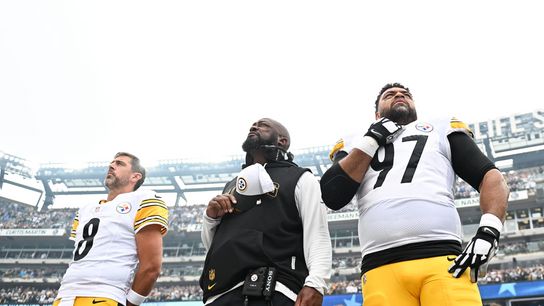From the compact Kabaddi arenas of India to global football stadiums, sport builds habits that shape character long after the match ends. Every rule, sprint, and tactical call forces players to adapt, learn, and persist. The smartest athletes don’t just play; they evolve. That’s what sport truly teaches.

Karl Roser / Pittsburgh Steelers
Steelers' Mike Tomlin stands next to captains Aaron Rodgers and Cam Heyward before the 2025 season opener.
Discipline in Motion
Discipline separates the skilled from the great. Kabaddi athletes repeat drills until movement becomes instinct – a reflex built through hundreds of hours on the mat. Footballers do the same with tactical sessions, learning to hold structure under pressure. It’s the same mindset that helps professionals stay focused when betting online, where quick decisions and patience often define success. Both require constant repetition, precision, and mental focus. One mistake in positioning or timing can decide everything.
Discipline also extends beyond training. Diet, recovery, and sleep form part of the invisible preparation fans never see. In both sports, structure keeps chaos under control. The player who respects the process wins more than the one chasing moments. Consistency is the quiet core of greatness.
The Power of Teamwork
Even the best individual talent breaks without cohesion. Every successful team builds around shared awareness and clear communication. Coordination defines whether a defense holds or collapses under pressure.
Real teamwork looks like this:
- Kabaddi defenders moving in sync to trap a raider.
- Football midfielders rotating positions without verbal cues.
- Substitutes stay mentally engaged, ready to fill any gap.
Each role connects to the next. A successful play depends on trust that every teammate will execute. Whether it’s covering space or timing a tackle, understanding others’ rhythm turns separate skills into one functioning system.
Strategy as a Shared Language
Strategy isn’t theory – it’s conversation in motion. Every sport creates a language of timing, signals, and decisions. The same kind of quick thinking applies to platforms like Melbet, where analyzing patterns and predicting outcomes mirrors reading a game in real time. Kabaddi’s lightning transitions and football’s evolving tactics both demand split-second reasoning. Understanding strategy means understanding the opponent’s psychology as much as your own.
Reading Opponents Under Pressure
Elite Kabaddi players analyze opponents with forensic precision. They study body angles, breathing rhythm, and subtle weight shifts before each lunge. A slight hesitation or imbalance gives away intent, and recognizing it within a fraction of a second can decide the outcome. One wrong judgment can turn a confident raid into a defensive collapse, so anticipation becomes as valuable as strength.
High-pressure moments amplify every decision. Fatigue clouds reaction time, and adrenaline distorts perception. That’s why professionals drill situational awareness until it becomes instinct. They learn to slow down mentally when everything speeds up physically. True mastery lies in patience – waiting for the right signal before striking with absolute control.
Building Tactical Awareness
Football thrives on anticipation and intelligent positioning. The best players don’t just react – they predict. They read the rhythm of the game, sense where space will open, and act before defenders can adjust. That skill comes from endless repetition, studying game footage, and communicating with teammates during every phase of play. Tactical awareness is about rhythm and structure, not showmanship or flair.

Karl Roser / Pittsburgh Steelers
Steelers' Cam Heyward gets ready for a play against the Cincinnati Bengals at home during the 2025 season.
Teams refine this awareness daily. They review opponent patterns, analyze pressing triggers, and adjust formation timing. A midfielder who anticipates a passing lane can dismantle a defense in seconds. The smartest teams understand how every role connects – movement, spacing, and awareness fuse into a single, fluid system.
Handling Failure and Comebacks
Every athlete faces moments when nothing goes right. Kabaddi stars mistime tackles, footballers misjudge passes, and teams crumble under pressure. What defines professionals is how they respond to those moments. Instead of excuses, they analyze footage, identify weak points, and adapt. Failure becomes feedback, not a verdict. Reflection, not frustration, is what rebuilds confidence and sharpens instinct for the next challenge.
Comebacks start with composure. A focused team can shift momentum even in the final minutes. Coaches look for players who recover quickly, reset mentally, and maintain discipline when chaos hits. Every setback tests emotional control. The athletes who learn from losses instead of fearing them are the ones who last the longest.
The Spirit Beyond the Game
Sport reflects discipline, teamwork, and perseverance in their purest form. From Kabaddi’s fearless contact to football’s tactical precision, athletes show what focus and courage look like under real pressure. Every game becomes a rehearsal for life – teaching how to adapt, trust others, and stay composed when everything is on the line. These lessons go far beyond the field, shaping how people work, lead, and recover from setbacks. That’s the scoreboard that truly matters.

